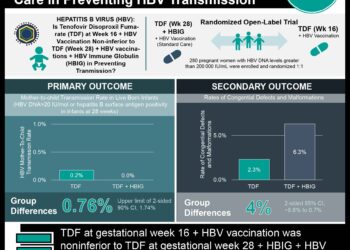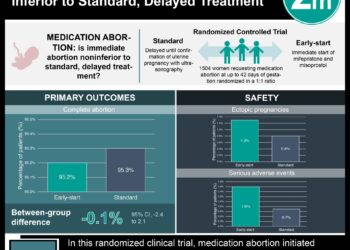Preterm delivery associated with long-term maternal cardiovascular risk
Image: PD
1. In a retrospective study, preterm delivery was an independent risk factor for future maternal cardiovascular-related hospitalizations.
2. The risk of maternal cardiovascular morbidity increased in a dose-dependent fashion with the number of preterm births.
Evidence Rating Level: 2 (Good)
Study Rundown: This population-based, retrospective cohort study identified a dose-dependent increase in a mother’s risk for future cardiovascular morbidity by number of preterm births. These results add to a growing literature base associating preterm delivery with adverse long-term maternal outcomes.
This study was conducted in a large, population-based cohort in southern Israel. Generalizability to other populations may be limited. Additionally, results may be confounded by socioeconomic status or ethnicity, which were not controlled for. Of note, there was a higher proportion of Bedoiun women in the PTD group than the control group (47.4 vs 29.6%, respectively) such that ethnicity-dependent differences in prenatal care between Bedoiuns and the Jewish majority might have systematically impacted outcomes. Prospective epidemiologic and basic science studies are merited to further characterize the association between preterm delivery and adverse long-term maternal outcomes.
Click to read the study in AJOG
Relevant Reading: Uptodate: Overview of preterm labor and birth
Study author Eyal Sheiner, MD, PhD, talks to 2 Minute Medicine: Department of Obstetrics and Gynecology, Soroka University Medical Center, University of the Negev, Beer-Sheva, Israel.
“The current study found that preterm delivery (PTD) is an independent risk factor for long-term cardiovascular morbidity in a follow-up period of more than a decade. In assessing a patient’s risk for cardiovascular disease, the clinician may consider pregnancy with an adverse outcome to represent the equivalent of a physiologic stress test for the purpose of future risk assessment. Women who previously have experienced preterm delivery might benefit from cardiovascular risk screening that could lead to early detection and perhaps secondary prevention of cardiovascular disease.”
In-Depth [retrospective cohort study]: This study included all females who delivered between 1988-1998 at the Soroka University Medical Center, the only hospital in the southern region of Israel. Patients were excluded if they had multiple pregnancies or known cardiovascular disease (CVD) before pregnancy. Women who delivered preterm (<37 weeks gestation) were compared with women who delivered term during the same period. Both cohorts were followed until 2010. The primary outcome was cardiovascular morbidity, defined as hospitalization for any cardiovascular reason
Of the 47,908 women who gave birth during the study period, 5,992 (12.5%) had a preterm delivery (PTD). Of women with a history of PTD, 5.1% were hospitalized during the follow-up period, compared with only 3.5% of women with no PTDs (OR=1.5, p=.001). Women with a history of PTD, whether spontaneous or provider-initiated, early (>34weeks gestation) or late (34-37 weeks gestation), experienced an increased incidence of cardiovascular morbidity. Cardiovascular risk was also found to be linearly associated with the number of preterm deliveries: 3.5% for 0 PTDs vs. 5.0% for 1 PTD vs. 5.5% for 2 or more PTDs (p=.001). Results remained significant after controlling for such confounders as metabolic syndrome, maternal age, labor induction, ethnicity, and anemia.
By Maren Shapiro and Leah Hawkins, MD, MPH
More from this author: IUD contraception equally safe in teenagers as in older women, Black men less likely to receive follow-up for elevated prostate cancer marker, PSA, Intake of fish fatty acids associated with lower risk of breast cancer, Lower prevalence of HPV infection in teen girls after vaccine introduction, Low incidence and high clearance of oral HPV in men
© 2013 2minutemedicine.com. All rights reserved. No works may be reproduced without written consent from 2minutemedicine.com. Disclaimer: We present factual information directly from peer reviewed medical journals. No post should be construed as medical advice and is not intended as such by the authors or by 2minutemedicine.com. PLEASE SEE A HEALTHCARE PROVIDER IN YOUR AREA IF YOU SEEK MEDICAL ADVICE OF ANY SORT. Content is produced in accordance with fair use copyrights solely and strictly for the purpose of teaching, news and criticism. No benefit, monetary or otherwise, is realized by any participants or the owner of this domain.







